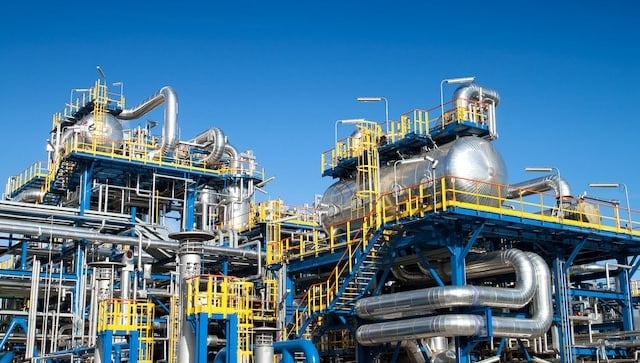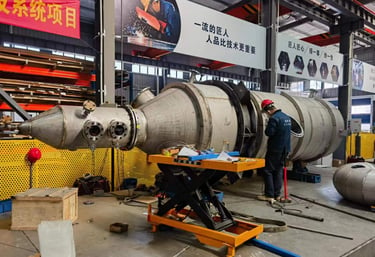Welding Applications in the Oil and Gas Industry
Overview: The oil and gas industry is a global behemoth, divided into three key sectors: Upstream, Midstream, and Downstream. Each sector presents unique challenges and demands, requiring robust and reliable infrastructure. Welding, a fundamental fabrication process, plays a critical role in ensuring the integrity and longevity of this infrastructure. This essay will explore the diverse welding applications across the oil and gas industry, highlighting its importance in maintaining operational efficiency and safety. Furthermore, it will showcase how PMI Piping, a reputable China Manufacturer specializing in Welded Piping and Custom Alloys Welded Products, contributes to the industry with high-quality components certified with DNV Certificates.
INDUSTRY INSIGHTPRODUCTS NEWS
6/17/20254 min read
Table of Contents
I. Introduction
II. Upstream Sector
III. Midstream Sector
IV. Downstream Sector
V. Benefits of Welding in the Oil and Gas Industry
Contents
I. Introduction
A. Overview of the oil and gas industry's three sectors: Upstream, Midstream, and Downstream.
The oil and gas industry is structured around three primary sectors: Upstream, Midstream, and Downstream. The Upstream sector encompasses exploration and production (E&P) activities, involving the search for and extraction of crude oil and natural gas. The Midstream sector focuses on the transportation and storage of these raw materials. The Downstream sector is responsible for refining crude oil into various products and distributing them to consumers.
B. Thesis: Welding is crucial across all sectors, with applications classified accordingly.
Welding is a critical process that underpins the functionality and safety of the entire oil and gas industry. From the initial exploration and extraction to the final distribution of refined products, welding is essential for constructing and maintaining the infrastructure required at each stage. This essay will demonstrate the diverse applications of welding across these sectors, highlighting its vital role in the industry.
II. Upstream Sector
A. Definition and activities of the Upstream sector (E&P).
The Upstream sector, also known as the Exploration and Production (E&P) sector, is responsible for locating, extracting, and producing crude oil and natural gas. This sector involves complex operations, often in challenging environments such as offshore platforms or remote onshore locations.
B. Applications of welding: flow lines, gathering lines, and support structures.
Welding is integral to the Upstream sector, used extensively in the construction of various components, including flow lines (pipelines connecting wells to processing facilities), gathering lines (networks of pipelines that collect crude oil and natural gas from multiple wells), and robust support structures for equipment and platforms. These welded structures must withstand harsh environmental conditions and high pressures.
C. Examples: Jack-up rigs, FPSO systems, SURF systems.
Examples of welding applications within the Upstream sector include the construction of jack-up rigs (mobile offshore drilling platforms), Floating Production Storage and Offloading (FPSO) systems (floating vessels used for processing and storing hydrocarbons), and Subsea Umbilicals, Risers, and Flowlines (SURF) systems (undersea infrastructure connecting subsea wells to surface facilities). The structural integrity of these complex systems relies heavily on high-quality welding.
III. Midstream Sector
A. Definition: transportation and storage of crude oil and gas.
The Midstream sector focuses on the transportation and storage of crude oil and natural gas. This sector connects the Upstream and Downstream sectors, ensuring the efficient movement of raw materials from production sites to refineries and distribution centers.
B. Primary application: transmission pipelines (Welded Piping).
The primary application of welding in the Midstream sector is the construction of transmission pipelines. These long-distance pipelines transport crude oil and natural gas across vast distances, requiring reliable and durable welds to prevent leaks and ensure safe operation.
C. Other applications: storage tanks and transport containers.
In addition to pipelines, welding is also used in the construction of storage tanks and transport containers used to store and move crude oil and natural gas. These welded structures must be capable of withstanding high pressures and corrosive environments.


IV. Downstream Sector
A. Definition: refining crude oil and distributing products.
The Downstream sector is responsible for refining crude oil into various products, such as gasoline, diesel, and jet fuel, and distributing these products to consumers. This sector involves complex processes and sophisticated equipment.
B. Applications in refineries: pipes, pressure vessels, supporting structures.
Welding is widely used in refineries for the construction of pipes, pressure vessels, and supporting structures. These welded components must withstand high temperatures, pressures, and corrosive chemicals.
C. Other applications: storage and transport vessels for refined products, distribution lines.
Welding is also used in the construction of storage and transport vessels for refined products, as well as distribution lines that deliver these products to consumers. Similar to the Midstream sector, these applications demand high-quality welding to ensure safe and reliable operation.
V. Benefits of Welding in the Oil and Gas Industry
A. Quality: durable components for extreme conditions.
Welding provides high-quality, durable components capable of withstanding the extreme conditions encountered in the oil and gas industry, including high pressures, temperatures, and corrosive environments.
B. Speed: crucial for maintenance and repair, minimizing downtime.
Welding is a relatively fast fabrication process, which is crucial for maintenance and repair operations. Quick repairs minimize downtime and ensure continued production.
C. Efficiency: enhanced through automation and specialized equipment.
Welding efficiency can be further enhanced through the use of automation and specialized equipment, reducing fabrication time and improving weld quality.
D. Versatility: adaptable to various sizes, materials, and environments.
Welding is a versatile process that can be adapted to various sizes, materials, and environments, making it suitable for a wide range of applications in the oil and gas industry. The use of Custom Alloys Welded Products expands this versatility.
E. Cost-effectiveness: relatively inexpensive fabrication method.
Welding is a relatively inexpensive fabrication method compared to other joining processes, making it a cost-effective solution for the oil and gas industry.
VI. Conclusion
A. Reaffirmation of welding's importance in the oil and gas industry.
Welding is undeniably a critical process that underpins the functionality and safety of the entire oil and gas industry. Its diverse applications across the Upstream, Midstream, and Downstream sectors demonstrate its vital role in maintaining operational efficiency and integrity.
B. Equipment is important for these welding applications
The equipment and components used in these welding applications are of paramount importance. PMI Piping, a leading China Manufacturer of Welded Products, offers a wide range of high-quality components, including stainless steel filters, pressure pipes, elbows, nozzles, heat exchangers, stainless steel storage tanks, separators, muffles, evaporators, and other welded products and components. Their products are designed to meet the stringent requirements of the oil and gas industry and are certified with DNV Certificates, ensuring quality and reliability. To learn more, please visit www.pmipiping.com or contact them at sales@pmipiping.com. The use of robust, reliable equipment, such as that provided by PMI Piping, is crucial for ensuring the safe and efficient operation of the oil and gas industry.


PMI PIPING Welding Applications in the Oil and Gas Industry (2)
PMI PIPING Welding Applications in the Oil and Gas Industry (1)
PMI Piping stands as a prominent China manufacturer specializing in the design and production of welded piping fabricated in corrosion-resistant alloys. We serviced industry cover petroleum, chemical, metallurgy, environmental protection, marine engineering, environmental engineering, new energy, energy storage, and pharmaceutical equipment.
Email : sales@pmipiping.com
Mobile: + 86 139 2823 4834
© 2025. PMI PIPING . All rights reserved.
Contact
NO.18,Xinye 4 Road, Shunde Distric, Foshan City,Guangdong P.R. China, 528300
Phone : + 86 757 2639 1388


